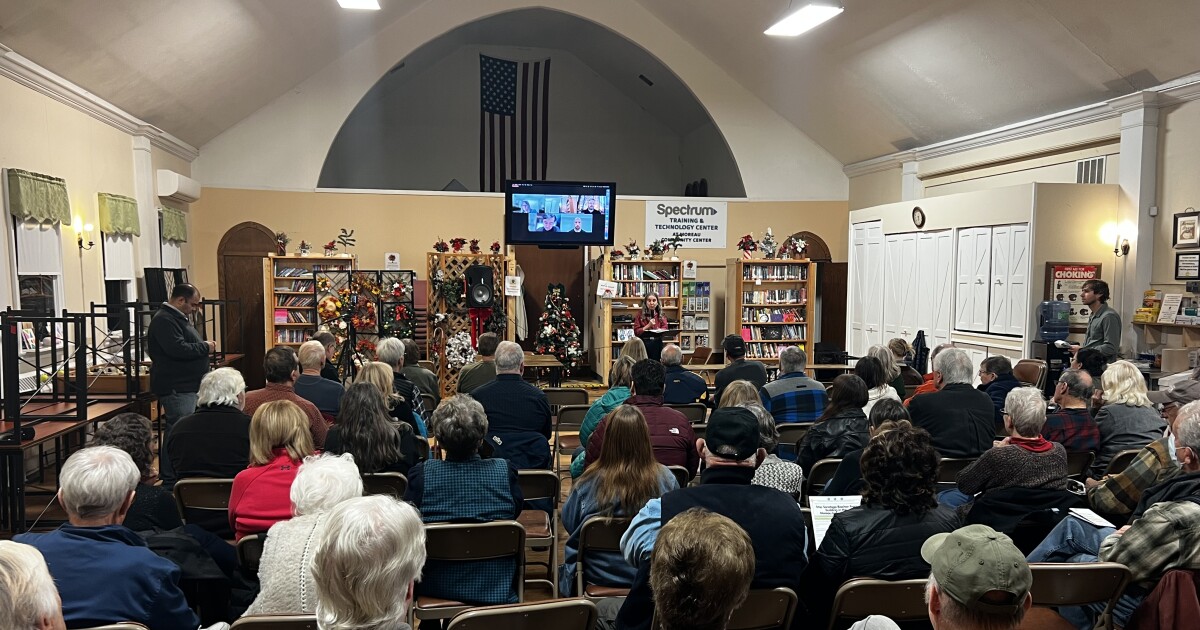Residents of Moreau and surrounding communities trying to stop a proposed biochar facility met with environmental advocates and attorneys on Thursday.
Saratoga Biochar Solutions is working to locate an $83 million facility in the northern Saratoga County community of Moreau, where residents are divided over the issue.
The process to create biochar involves burning “biosolids,” or sewage sludge, in an absence of oxygen resulting in a carbon fertilizer. Saratoga Biochar claims its pyrolysis process removes harmful chemicals from biosolids, while diverting human waste from other disposal methods that pose environmental and safety risks.
At the Moreau Community Center in South Glens Falls, environmental advocates said the sewage, which Saratoga Biochar would transport through residential neighborhoods, would contain harmful “forever chemicals” like PFAS, linked to ill-health effects like cancer, and the plant could introduce mercury and other pollutants into the surrounding environment.
Tracy Frisch, a board member of the Clean Air Action Network, helped organize the event. She said the large turnout points to community frustration with Moreau’s town government, which she said has not acted transparently.
“Twice the planning board members voted to hire an expert,” explained Frisch. “An independent expert to review the – to give them some background that they didn’t have. And twice the process stopped cold. You know, at one point the zoning administrator asked the planning board members to give input on scope of work and then nothing happened.”
The biochar facility dominated town politics in this month’s election. Voters elected Moreau United candidate Jesse Fish by a nearly 3-to-1 margin over Republican town supervisor Todd Kusnierz. Fish ran as a vocal opponent of the biochar facility.
Speaking with WAMC, Kusnierz said that his opposition weaponized the biochar issue against the town board for political gain, and contends this was the most vetted project ever put before the planning board.
“Planning boards don’t have the leisure of taking people’s emotions into consideration when they make their determinations,” said Kusnierz. “It’s strictly based on the regulations, and laws, zoning that are in place. They have to follow the zoning.”
Saratoga Biochar did not respond to requests for comment from WAMC.
John Donohue, a part of the Moreau United candidate, won a second term on the board.
Donohue says the town board is prepared to fight the proposal, though he says it’s unclear if the board has the full ability to stop it.
“So, we got to fight this on every front. And the team we just elected here in the town of Moreau a week ago Tuesday – we’re committed,” said Donohue. “We’re committed to doing everything we can possibly do to keep Saratoga Biochar out of our communities. We have some things that we might be able to do, we don’t promise anybody anything but we are going to fight and we are going to fight hard.”
Jim Toler, a resident of Moreau, reiterated how the frustration felt by many residents of Moreau over Saratoga Biochar’s proposed facility manifested in recent elections.
“For the first time in a long time my vote counted. I feel strongly about that. Unanimously we put this new town board in and I’m expecting results from them. They know what the people of Moreau want, and the town of Moreau wants, we want to get rid of Biochar, simple as that,” explained Toler. “So, that’s why – this lawyer cleared a lot of stuff up even though he couldn’t make commitments he answered some questions. But my main question is; now, going forward, will this new town board be able to stop this madness?”
Philip Gitlen lives in Greenwich in neighboring Washington County and has more than four decades of experience in the field of environmental law including as a former General Counsel at the New York State Department of Environmental Conservation.
Gitlen was one of the experts who spoke to the crowd via Zoom, and has been working on various ways residents and organizers can combat Saratoga Biochar’s proposal.
“So, I went for the simple, the simple part,” said Gitlen. “Which was, the existing town law prohibits the processing, in the town, of any waste material that originates from a commercial or an industrial source, and the biosolids fall into that category.”
Sam Price is a law student at Pace University and works for the Pace Environmental Litigation Clinic, which is representing opponents of Saratoga Biochar. Price disputed the Moreau planning board’s determination that there would be no significant environmental impacts linked to the proposed facility.
Price outlined how the Clean Air Action Network’s lawsuit claims that the town’s planning board was unreasonable in its assessment of the facility’s potential environmental impacts.
“At the bottom line here we’re saying that the decision was a kooky decision,” joked Price. “We don’t say the word kooky in our briefs, I assure you, but, you know, I just wanted to be very clear that it is reasonability – that is the basis of what the determinations are made when we are trying to prove that something is ‘arbitrary and capricious.’”
The New York State Supreme Court ruled in favor of the Moreau planning board and Saratoga Biochar in June, upholding an assessment that the facility’s environmental impact would be negligible. The coalition of organizations opposed to the project have appealed that decision.
